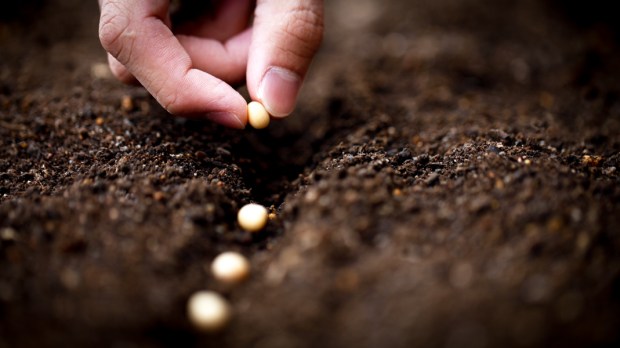“The seed sown on rich soilis the one who hears the word and understands it,who indeed bears fruit and yields a hundred or sixty or thirtyfold.”
—Matthew 13:23
Once upon a time, a teacher told a story. It simply began: “A sower went out to sow …” It’s a story that has come down to us largely unchanged from the way it was first told. And it is a story that we know well.
Unfortunately, it seems that many of the stories told by Jesus (the parables) have lost their power to surprise and inspire us. There seem to be two reasons for this. The first is that they often include images and anecdotes from everyday life that are significantly unrelated to most of our day-to-day lives. After all, how many of us have any first-hand experience with sowing seeds in a field and understand what goes into cultivating a fruitful harvest? The second reason why these stories have lost their impact is that we know them too well. With the stories of the Prodigal Son and the Good Samaritan, the Parable of the Sower and the Seed is among the best-known of these stories of Jesus.
In Saint Matthew’s account of the Parable of the Sower (13:1-9, 18-23), we have Jesus telling a story of a man who went out to sow seeds. As he scattered the seed, some fell on a path, others fell onto rocky ground with little soil, and some seed fell among thorns and weeds. But some of the seed fell on rich, fertile soil and produced an abundant harvest. Jesus himself goes on to explain the meaning of the parable. It all seems fairly clear. The seed is God’s Word and the different kinds of soil represent the hearer’s ability to receive the Word and allow it to grow and flourish in our hearts. The harvest could be said to be our good works and faith, which are given for the nourishment of the world.
It all seems so simple. And, in fact, it is.
But as I read this parable alongside the words of the prophet Isaiah in our First Reading (55:10-11), two points of reflection came to me.
First, Isaiah reminds us that God speaks to us, intent that “my word shall not return to me void, but shall do my will, achieving the end for which I sent it.” So, the gifts of Providence aren’t given for our own consolation and enlightenment, they are given for a purpose: “Just as from the heavens the rain and snow come down and do not return there till they have watered the earth, making it fertile and fruitful, giving seed to the one who sows and bread to the one who eats, so shall my word be that goes forth from my mouth.” The Letter to the Hebrews reminds us that, “the Word of God is alive and active” (4:12).
God scatters the seed whether we’re ready, paying attention, or willing to receive the seed at all. This is part of God’s gracious self-giving. God is always speaking to us and the seed is always being sown.
And so, this leads to the second point. We have a responsibility to prepare the soil and cultivate a rich harvest.
I’ve often used this parable as a sort of “examination of conscience,” trying to figure out my heart-soil. Am I rocky and shallow? Am I distracted with the weeds of “things” and other pointless distractions and cares? But if we stop there, we are missing the call that is included in this story—Jesus is inviting us to be sure to prepare the soil and to care for what God has planted within us. Dirt-packed paths can be broken up and the soil enriched, rocks and debris can be removed, and thorns and weeds can be torn out, leaving behind fertile space for growing. We have a part to play in this, other than simply being receptive.
In many ways, I think this parable summarizes what Ordinary Time is all about. This is the season of the year in which we are given time and space to “farm” our hearts and souls to make the most of what we receive in the other seasons of the year. We have the feasts of saints and the great events of Jesus’ life to inspire us and invigorate us as we do this hard work of becoming better disciples of Jesus. Entering these mysteries is key and this work can only be done through prayer, discernment, and works of care and compassion that take us outside of ourselves and our own places of comfort. This is the ordinary time when we are being called to extraordinary work.
How does reading the Parable of the Sower as a call to conversion challenge you? What are signs that the Word of God has taken root and is growing inside a person?How is the Word of God “alive and active” in the Church? in you?
Words of Wisdom: “Store up in your minds the Lord’s words which you receive through your ears, for the Word of the Lord is the nourishment of the mind … Be careful that the seed received through your ears remains in your heart.”—Pope Saint Gregory the Great, Forty Gospel Homilies

